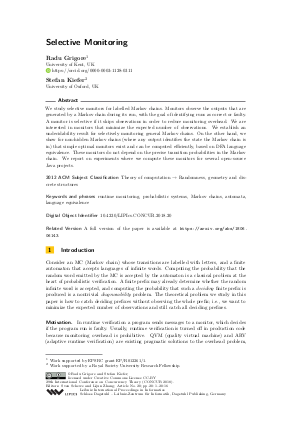Selective Monitoring
Authors
Radu Grigore  ,
Stefan Kiefer
,
Stefan Kiefer
-
Part of:
Volume:
29th International Conference on Concurrency Theory (CONCUR 2018)
Part of: Series: Leibniz International Proceedings in Informatics (LIPIcs)
Part of: Conference: International Conference on Concurrency Theory (CONCUR) - License:
 Creative Commons Attribution 3.0 Unported license
Creative Commons Attribution 3.0 Unported license
- Publication Date: 2018-08-31
File

PDF
LIPIcs.CONCUR.2018.20.pdf
- Filesize: 0.52 MB
- 16 pages
Document Identifiers
Related Versions
Subject Classification
ACM Subject Classification
- Theory of computation → Randomness, geometry and discrete structures
Keywords
- runtime monitoring
- probabilistic systems
- Markov chains
- automata
- language equivalence
Metrics
- Access Statistics
-
Total Accesses (updated on a weekly basis)
0PDF Downloads0Metadata Views
Abstract
We study selective monitors for labelled Markov chains. Monitors observe the outputs that are generated by a Markov chain during its run, with the goal of identifying runs as correct or faulty. A monitor is selective if it skips observations in order to reduce monitoring overhead. We are interested in monitors that minimize the expected number of observations. We establish an undecidability result for selectively monitoring general Markov chains. On the other hand, we show for non-hidden Markov chains (where any output identifies the state the Markov chain is in) that simple optimal monitors exist and can be computed efficiently, based on DFA language equivalence. These monitors do not depend on the precise transition probabilities in the Markov chain. We report on experiments where we compute these monitors for several open-source Java projects.
Cite As Get BibTex
Radu Grigore and Stefan Kiefer. Selective Monitoring. In 29th International Conference on Concurrency Theory (CONCUR 2018). Leibniz International Proceedings in Informatics (LIPIcs), Volume 118, pp. 20:1-20:16, Schloss Dagstuhl – Leibniz-Zentrum für Informatik (2018)
https://doi.org/10.4230/LIPIcs.CONCUR.2018.20
BibTex
@InProceedings{grigore_et_al:LIPIcs.CONCUR.2018.20,
author = {Grigore, Radu and Kiefer, Stefan},
title = {{Selective Monitoring}},
booktitle = {29th International Conference on Concurrency Theory (CONCUR 2018)},
pages = {20:1--20:16},
series = {Leibniz International Proceedings in Informatics (LIPIcs)},
ISBN = {978-3-95977-087-3},
ISSN = {1868-8969},
year = {2018},
volume = {118},
editor = {Schewe, Sven and Zhang, Lijun},
publisher = {Schloss Dagstuhl -- Leibniz-Zentrum f{\"u}r Informatik},
address = {Dagstuhl, Germany},
URL = {https://drops.dagstuhl.de/entities/document/10.4230/LIPIcs.CONCUR.2018.20},
URN = {urn:nbn:de:0030-drops-95586},
doi = {10.4230/LIPIcs.CONCUR.2018.20},
annote = {Keywords: runtime monitoring, probabilistic systems, Markov chains, automata, language equivalence}
}
Author Details
Funding
- Grigore, Radu: Work supported by EPSRC grant EP/R012261/1.
- Kiefer, Stefan: Work supported by a Royal Society University Research Fellowship.
References
-
Matthew Arnold, Martin T. Vechev, and Eran Yahav. QVM: an efficient runtime for detecting defects in deployed systems. In OOPSLA, 2008.

-
C. Baier and J.-P. Katoen. Principles of model checking. MIT Press, 2008.

-
Ezio Bartocci, Radu Grosu, Atul Karmarkar, Scott A. Smolka, Scott D. Stoller, Erez Zadok, and Justin Seyster. Adaptive runtime verification. In RV, 2012.

-
N. Bertrand, S. Haddad, and E. Lefaucheux. Foundation of diagnosis and predictability in probabilistic systems. In Proceedings of FSTTCS, volume 29 of LIPIcs, pages 417-429, 2014.

-
N. Bertrand, S. Haddad, and E. Lefaucheux. Accurate approximate diagnosability of stochastic systems. In Proceedings of LATA, pages 549-561. Springer, 2016.

-
Laura Bocchi, Tzu-Chun Chen, Romain Demangeon, Kohei Honda, and Nobuko Yoshida. Monitoring networks through multiparty session types. TCS, 2017.

-
Mikołaj Bojánczyk, Bartek Klin, and Sławomir Lasota. Automata theory in nominal sets. LMCS, 2014.

-
C. Calcagno, D. Distefano, J. Dubreil, D. Gabi, P. Hooimeijer, M. Luca, P. O'Hearn, I. Papakonstantinou, J. Purbrick, and D. Rodriguez. Moving fast with software verification. In NASA Formal Methods Symposium, 2015.

-
C. Calcagno, D. Distefano, P.W. O'Hearn, and H. Yang. Compositional shape analysis by means of bi-abduction. JACM, 2011.

-
Loris D'Antoni and Margus Veanes. The power of symbolic automata and transducers. In CAV, 2017.

-
Stéphane Demri and Ranko Lazić. LTL with the freeze quantifier and register automata. TOCL, 2009.

- Gurobi Optimization, Inc. Gurobi optimizer reference manual. http://www.gurobi.com, 2017.
- Klaus Havelund, Martin Leucker, Giles Reger, and Volker Stolz. A Shared Challenge in Behavioural Specification (Dagstuhl Seminar 17462). Dagstuhl Reports, 2018. URL: http://dx.doi.org/10.4230/DagRep.7.11.59.
-
S. Jiang, Z. Huang, V. Chandra, and R. Kumar. A polynomial algorithm for testing diagnosability of discrete-event systems. IEEE Transactions on Automatic Control, 46(8):1318-1321, 2001.

-
K. Kalajdzic, E. Bartocci, S.A. Smolka, S.D. Stoller, and R. Grosu. Runtime verification with particle filtering. In RV, 2013.

-
J.-Y. Kao, N. Rampersad, and J. Shallit. On NFAs where all states are final, initial, or both. Theoretical Computer Science, 410(47):5010-5021, 2009.

-
Brian G. Leroux. Maximum-likelihood estimation for hidden markov models. Stochastic Processes and Their Applications, 1992.

-
Grigore Rosu and Feng Chen. Semantics and algorithms for parametric monitoring. LMCS, 2012.

-
M. Sampath, R. Sengupta, S. Lafortune, K. Sinnamohideen, and D. Teneketzis. Diagnosability of discrete-event systems. IEEE Transactions on Automatic Control, 40(9):1555-1575, 1995.

-
A. Prasad Sistla, Miloš Žefran, and Yao Feng. Monitorability of stochastic dynamical systems. In Proceedings of CAV, pages 720-736. Springer, 2011.

-
S.D. Stoller, E. Bartocci, J. Seyster, R. Grosu, K. Havelund, S.A. Smolka, and E. Zadok. Runtime verification with state estimation. In RV, 2011.

-
D. Thorsley and D. Teneketzis. Diagnosability of stochastic discrete-event systems. IEEE Transactions on Automatic Control, 50(4):476-492, 2005.

